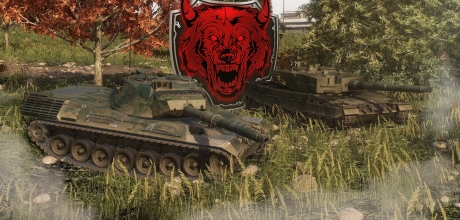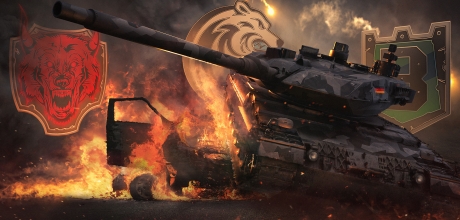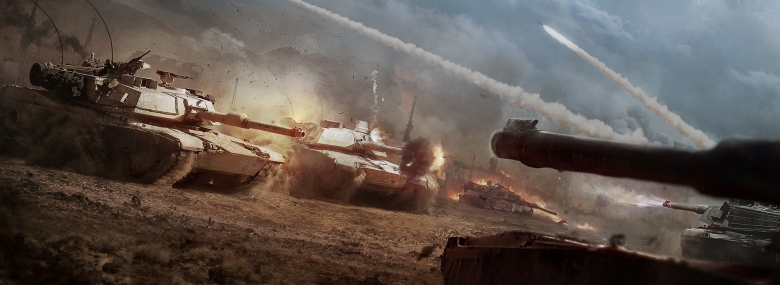
In the upcoming Panzer Showdown, three factions will clash - each for different reasons. Today, we are introducing the third one - the Bulwark.

He was standing outside of the farm, leaning against an idling APC and smoking a cigarette when he heard the gunshots from inside. Startled, he picked up his rifle and ran towards the sound. His squad leader was standing over the dead bodies of the farmer and his wife, an ugly grin on his face and a smoking pistol in his hand.
He yelled out but suddenly his world disappeared in a loud bang and flash.
When he woke up, he found out he was being carried by two of his squad mates. All around them, silent men with grim faces were pointing guns at them and he realized to his amazement that his entire squad was being taken prisoner by what appeared to be a platoon-sized unit with an insignia he did not recognize. That was something extraordinary – in a world where food and clean water were at premium, few bothered with capturing anyone alive. Especially anyone found standing over the dead bodies of two unarmed and tied people. The Geneva conventions did not apply to mercenaries – or pillagers.
He caught a glimpse of some of the men taking the dead outside and covering them with a piece of cloth before his captors pushed the three of them into what was formerly their APC. They must have had a driver with them, as the vehicle started moving soon afterwards.
When they forced him out, he found himself in a town square surrounded by roughly two dozen uniformed men. They were all silent. His captors brought all of his squad to the middle of the square and made them kneel on the cold February ground.
A middle-aged man walked towards them, his face perfectly neutral. He was dressed in an unassuming uniform and the only thing hinting at the fact that he was the commander of the entire force was the air of quiet authority around him.
The leader was approached by one of his men. The exchange ended with a curt nod from the commander as he approached the prisoners. For a short while, he simply stood there looking at them silently, as if he was considering what to say.
“You know why you are here”, he started finally.
“We’ve been hunting those who prey on the good people around here for a while now. You are not the first we've caught, nor will you be the last. Despite your crimes, you will be treated fairly. You will be given food, water, and shelter until we transfer you to the authorities.”
The man stopped, his face revealing something for a second that could only be described as sadness. The captured squad started looking at each other hopefully. Before anyone could say anything, the man added:
“I have only one question. Who killed the family?”
The eyes of the squad shot to their former squad leader. The commander nodded to himself and then pointed at the two troopers standing nearby. They picked the squad leader up and pushed him into one of the nearby houses.
It started to drizzle but it wasn’t the rain that sent the shivers down the captured man’s spine. The silence was interrupted by the sound of a single gunshot. The commander nodded again.
“Right then. Let’s get these men sorted out.”
The New Frontier
As the 2020s unraveled, most men did nothing to prevent society’s fall into anarchy and chaos. Some saw it as an opportunity to rise using their cunning or violence, but most men and women only wanted the same thing common people always do – peace and stability.
For them, peace was no longer something taken for granted like it had been for generations past. It was their ultimate goal, something to strive for but something ephemeral; something that could be gone in an instant.
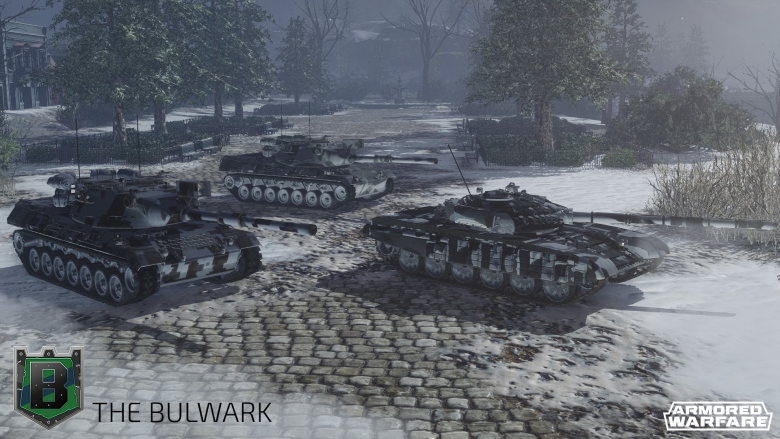
During the waves of unrest in the 2020s, the law enforcement and judicial systems broke down under the pressure of thousands of crimes each day, giving rise to hundreds of private law-keeping bands and companies, formed by those who wanted nothing but order. Nearly two hundred years after the taming of the Wild West, a new lawless frontier appeared in southern Germany and Austria, the most affected regions becoming known as “the Frontier”.
These private companies would often deal with those who they perceived as law-breakers in the harshest of ways and would even occasionally fight one another, seeing others of their kind as nothing but usurpers. The remaining regular state police and even military forces were constantly attempting to push these paramilitary vigilante units out of the inhabited areas, but rarely had the strength or will to do so with many former policemen realizing the futility of the effort and deserting – or even joining the vigilante units.
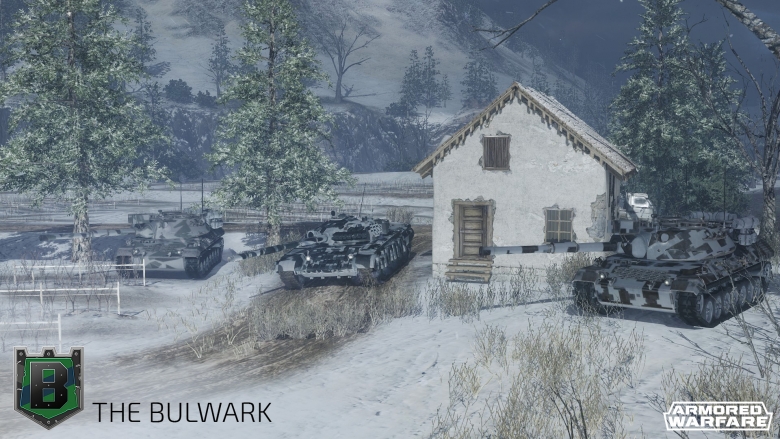
This volatile state lasted for several years with many of the smaller forces merging into larger ones and eventually disbanding again or turning into regular Private Military Companies, running local security in exchange for food, shelter, and whatever small pay the local populace could scrounge up. These PMCs essentially acted as a police force and militia bringing much needed stability to the south-German, Austrian, and Bohemian borderlands.
During the height of their power, more than 30 percent of Bavaria and Austria was effectively under PMC control.
The composition of the units varied wildly and they included anyone willing to fight or who were looking to start a new life. They often included military veterans and even criminals, but they all had one thing in common – the ideal to protect what they perceived as “theirs” – be it communes, towns, or villages. While logical, this short-sighted approach prevented the creation of a large and effective fighting force capable of responding to larger threats such as unscrupulous mercenary bands using heavy weaponry, often looted from abandoned military bases or purchased on black market.
The Bulwark Initiative
In response to the rise of what was generally perceived as a “mercenary threat”, several of the most influential Frontier community leaders got together to discuss future collaborative efforts. While the initial meeting did not bring any concrete results, it did lay down the foundation for cooperation that eventually resulted in what became known as the “Bulwark initiative”.
Several mercenary attacks on strategic objects in the Frontier region gave the initiative a sense of urgency, and after months of talks and deliberations, a joint command center for several of the largest PMCs of the Bulwark Initiative was established in Linz under the command of Franz Steindl, a former colonel of the Österreichisches Bundesheer.
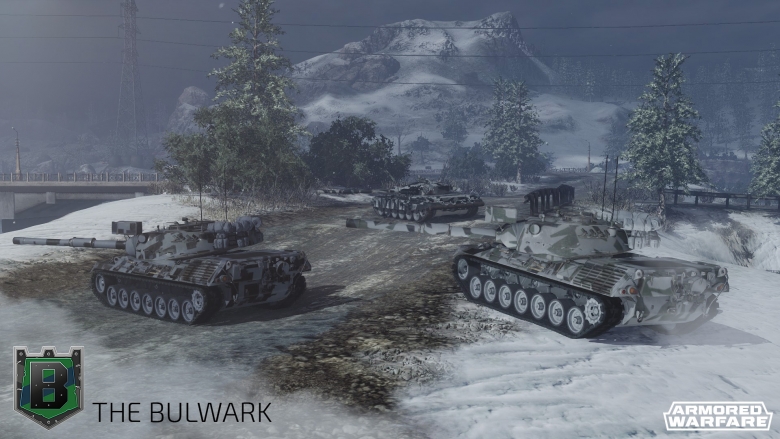
The official goal of the Initiative was the protection of the Frontier. Its military forces consisted of more than two dozen smaller PMCs united under the Shield banner, although the majority of the military power came from the three largest units: 13th Austrian Dragoons stationed in Linz, equipped with the largest number of armored vehicles), Landsknechts stationed in Regensburg with the most modern equipment of the three and Lionsguard stationed in western Bohemia with only lighter vehicles but operating a number of strongpoints in the Frontier region.
While not as strong as other more famous mercenary outfits such as the Hellhounds, the Bulwark forces became known for their nobility on the battlefield and general reluctance to commit acts they perceived as immoral.
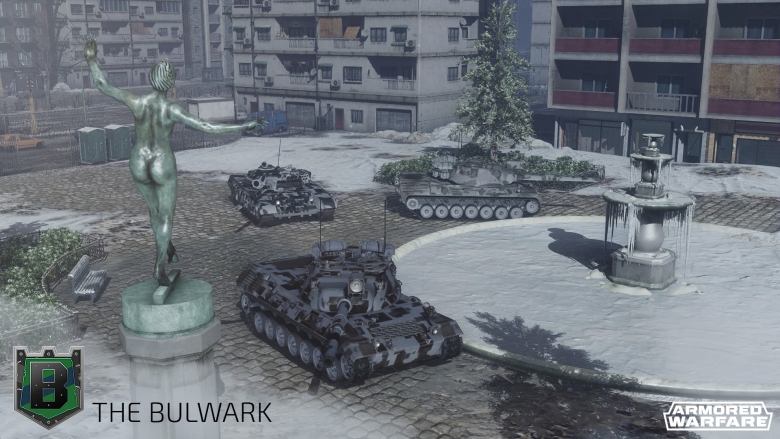
In the age of madness and chaos, their leaders argued that one could only protect the last vestiges of human decency through noble acts. Attempting to living up to the example set by the commanders, the Bulwark forces never targeted civilian populations and always attempted to resolve conflicts through diplomacy first. Despite the strain on their resources, taking prisoners on the field of battle became – with some exceptions – a standard practice, and any crimes committed by the members of the Bulwark Initiative were severely punished.
For months the Initiative kept peace and order throughout the Frontier – but peace was a fragile thing that would not last.




